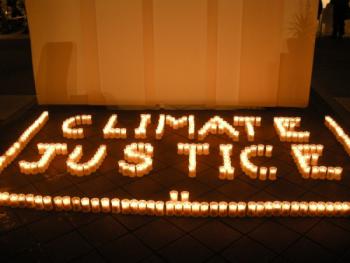Serendip is an independent site partnering with faculty at multiple colleges and universities around the world. Happy exploring!
PJSA Conference


I was lucky to be able to attend the Peace and Justice Studies Association Annual Conference at Tufts University in October, 2012. Many of the sessions I attended were relevant to my coursework and extracurricular activities, but a few in particular stood out. One was called “Living Our Way Into the Answers: A Workshop on Transformative Pedagogy.” The workshop had about thirty participants, and ended up being split relatively evenly between students and professors. Much of the conversation, therefore, ended up being a dialogue about what transformative pedagogy means for students versus the perspective that educators have. Many professors talked about how difficult it can be to introduce radical pedagogy in a system obsessed with learning objectives and outcomes, and how emotionally drained they felt – like they just didn’t have the energy to be “transformative” anymore. It became clear throughout the workshop that many people feel that dialogue-based classrooms have the potential to affect attitudes toward peace on a societal level, but still struggled on how to implement such pedagogy.
As part of the workshop we split into groups, and I ended up being with another student and three professors. A lot of our conversation related to the idea of what it means when discussion ends up letting some of the content of a course fall to the wayside. The professors stressed how first-generation college students from lower socioeconomic backgrounds are often just looking for the tools they’ll need to get a good job when they go to college. The big question we had, of course, is where to find the line between giving people the cues they need to succeed, while still allowing them to see problems within the system and possibly inspiring them to work to change it. We never really came up with an answer. But, it was refreshing to see that so many students and professors from around the world were asking these questions about pedagogy and peace education, and were looking at how both are complicated by issues of privilege. My group also made a web of transformative pedagogy, which I’ve shared below.

Another session that most related to my life as a student was called “Restorative Justice on College Campuses” and looked at a new student mediation program at Guilford College. The presenters, professors Amal Khoury and Jeremy Rinker, explained how the program stemmed from Guilford’s Quaker roots, and provided students, faculty, staff, and local residents with a way to handle disputes nonviolently and with a skilled mediator. In particular, in the past there had been many altercations between Guilford students, who have a long tradition of building large bonfires in a forest adjacent to campus, and local residents, who worry that fires are dangerous and could quickly spread. The mediation program follows many of the tenets of restorative justice theory, which focuses on allowing victims and offenders to come together and mutually decide what the response will be to an offense. In particular, restorative justice practices try to let “offenders” start to repair some of the harm that has been caused by their actions.
A Guilford student, Haverford student, and Swathmore student were in the session with me, and we all tried to participate in the discussion portion of the session by comparing how conflict is dealt with at our respective schools – all of which have Quaker roots. At Bryn Mawr and Haverford, for instance, our honor codes play an important role in student life. Everything from social to academic offenses are taken to the honor board at each school, who try to come up with a solution that is best for the community, rather than thinking punitively about what would be a “fitting punishment.” Seeing all of our different means of handling campus conflict was heartening because it helped me to realize that the concepts I learn about in Peace and Conflict Studies courses are already being applied to the small world I’m a part of at school.


Comments
Post new comment